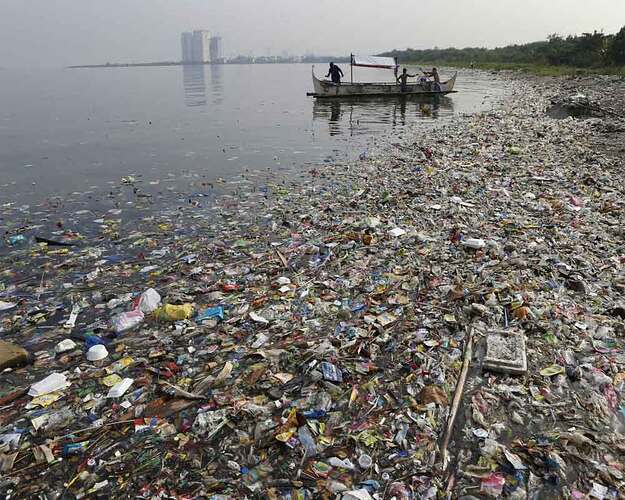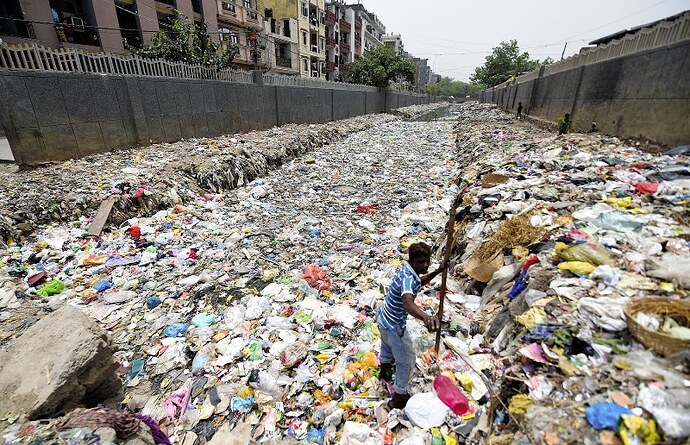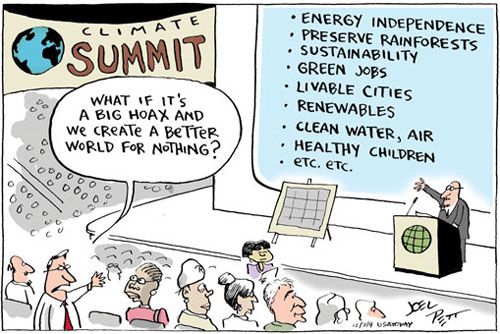All hail Swiss Thanos 
I think we’re already facing the consequences now, and will increasingly so until the end of this century. Can you really talk about hundreds of years into the future with a straight face? Imagine you’re in 1776 America and try to see 200 years into the future. Or even in 1900. I think if we don’t suffer catastrophe within the next 100 years, the technology will help us to solve the resource restriction.
I just think it’s very easy to pollute an ocean, much harder to clean it up. You can’t bring an animal species back to life. So we should make pressure to keep our environment destruction in check. And I don’t mean banning straws. I mean making it economically unprofitable to produce single-use garbage. Places like Zara where you buy a t-shirt for $10 shouldn’t exist.
The free market isn’t perfect and will never be. Some regulations are necessary, otherwise hell would break loose. A good example is the Antitrust law (Kartellgesetz). Without that, we would probably pay 500 CHF per month for 10Mbits internet.
Regulations regarding environment are also important. Or do you want that factories and cars emissions result in lung cancer for anyone above 45?
I read you and I am thinking if you are really in the FIRE movement 
The achievements of the last decades cars, meat … and I am a bit surprise.
At the end you should do what makes you happy. But if you just travel, cars, … (pure consumption) …
In regards of the environmental discussion here, it is true. We are overpopulated and as we thought that we have unlimited resources we never took care about reusing at the end you can be selfish in a way and ignore it or act and try to help even if it is a bit.
That’s not how a monopol works lol. And there would be many without regulations.
You’ll have to limit them by killing them I am afraid, birth control will probably not be a fast enough approach.
Don’t know any from the Western world, as we have a highly regulated market already. You probably have to look at countries like Bolivia (Cochabamba Water War) to see realworld examples.
Any basic economics class will discuss how monopolies are formed and why they are very bad for the free market. Monopols lead to less goods/services produced with a higher price and thus to a walfare loss.
Microsoft might be a good example too. In the 80/90s when they kept out the competition with preinstalling software packages on every computer that was sold.
Good regulations would protect the little guy and reduce barriers to entry. In such a setting, no monopoly would survive very long, unless it’s actually beneficial for the economy (there were such cases in the past).
Bad regulations come under the guise of protecting the little guy, but in truth they introduce so much red tape, that the little guy is unable to cope, and the big guys can spare some of their profit to take care of the new regulations.
For example, the government in Poland decided to make Sunday a trade-free day, to give people a day to rest. What happened, is that large shops found loopholes, they either became post offices or some other funny exception. Small shops started to close down at a higher pace.
Another thing would be minimum wage. When you have a functioning business model, it’s easier to swallow a raise in minimum wage.
A strong country has an efficient judiciary system and low corruption. So if a large corporation emerges, it is less likely to make laws that suit this corporation. Sadly, I don’t think that’s what’s going on even in the US. The Big Tech are in cahoots with the dems.
How is this making prices “artificially” high? In a free market with no regulations I could just dump all my waste and toxic byproducts in the Rhein or Genfersee for free. Thus being able to offer a lower price. Preventing that wouldn’t make the price articifially higher, it would put the price exactly where it should be.
Right now we don’t account for such devastating effects on our health and the environment. So in reality the current prices are actually artificially low.
I hope you are right, but switching to a decarbonised economy (including reducing factory farming of animals - to stay in topic) will cost us a tiny fraction of what the “business as usual” scenarios probably will imply. I see it as paying the health insurance premium and I think we’d be stupid taking the risk.
If all turned out to be “fear mongering”, as you say, we’ll still have a world without the air being polluted by the burning of fossil fuels, ultimately saving and improving millions of lives just because of the better air quality. It’ll cost a bit of effort now, but it’ll pay back in the future, like investing our savings for retirement instead of spending it all.
I agree with you that even if there is a small chance we’ll be overreacting, the downsides to inaction are sufficiently large that it warrants quite high costs.
I would also say that there are a terrifyingly large fraction of young people (around 12-30) who have an incredibly pessimistic view of the future.
Many of them believe that if we don’t meet the 1.5° target, it’s basically over (e.g. there’s no sense in having children because earth will become uninhabitable).
This leads them to believe stuff like “We only have a year left to stop climate change!” and to sometimes act on it in the extreme: (e.g. see the “Hunger Strike for the Last Generation” on the extreme end).
This is almost certainly wrong and the psychological toll this takes on those younger people is unsustainable and avoidable.
It’s wrong because climate change most probably doesn’t behave according to step functions. Most scientists realize that the 1.5° target will be surpassed and have shifted their goal to a 2° target.
It’s unsustainable because to combat climate change you need to act now but even more importantly be in it for the coming decades. Fatalistic beliefs seem pretty unhelpful in doing the latter.
Patron must be the most incoherent idelogical person I’ve ever read.
State intervention to put mask on public transportation: “Extremely bad!”
but then he easily accepts that government must close successful private entreprise (some of them do not receive state subsidy) such as kitas, private schools, tagesmutter/maman-de-jour etc to indirectly force population control? lol.
How can somebody swing from pure captilastic-anarchic, stateless position, to forced population control through state intervention in the free and private life of citizen, communist China-style.
Btw, even if we kill 50% of the people of the planet tomorrow (let that sink in: your wife, if you have kids, one of them probably. One of your parents. etc. Basically half of the people you know) and we remove any environment regulation, we would still be fucked. Because most pollution is caused by the top10% richest people in the world, and if you halved that to 5%, end take away regulation, we are still fucked.
Lifestyle matters a lot. More than population size.
Not sure if this is true and for sure not in all cases.
When we look at the water, the semi develop countries + china (even if they are trying to catch up fast, they are the factory of our world) are top one. Just by looking the most contaminated rivers
But I agree with the rest including your opinion about Patron 
In the past business owners would build chemical factories that damaged local populations. After a while people understood the damage that was being done and business owners were forced to pay for protective measures and to clean up their mess. The cost gets passed on to customers
Are you saying this is not a good thing? Because it is exactly the same with CO2. We are not currently paying for the cost of the protective measures.
First libertarian I ever heard of who doesn’t believe that people respond to price incentives. It’s almost as if you went full circle and ended up closer to communist perceptions of how market works.
If you believe in the free market, that should be obvious (if it’s priced according to externalities, the businesses will adjust their practices towards less emitting practices).
The tax doesn’t even have to be allocated to the government, it can go back to the people (afaik that’s what most proposals do).
Sure, then let’s use the extra revenue to lower corporate tax, then you’d be in favor?
Pay for the damage you cause is a fair principle. No such system will be perfect but that isn’t an excuse to do nothing
If USA doesn’t play the game then you are right it doesn’t work
If USA are on board, incentives can be found for almost all other countries to avoid the extreme situation you describe (import duties, withold subisidies etc)




